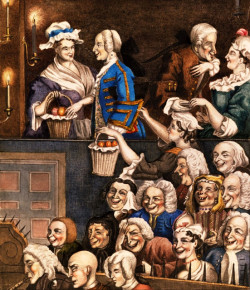What was the penalty in Pennsylvania for putting on a play?
 May 31, 1759 — Based on religious and moral grounds, many Colonists in early America were bitterly opposed to acting, and to the concept of the theater in general. But some states took it further when their legislatures passed laws outlawing theater performances:
May 31, 1759 — Based on religious and moral grounds, many Colonists in early America were bitterly opposed to acting, and to the concept of the theater in general. But some states took it further when their legislatures passed laws outlawing theater performances:
+ In 1750 the General Court of Massachusetts passed an act prohibiting stage plays and theatrical entertainments of any kind.
+ Today in 1759, the House of Representatives in the Colony of Pennsylvania passed a law forbidding the showing and acting of plays under a penalty of £500.
+ In 1761, Rhode Island passed “an act to Prevent Stage Plays and other Theatrical Entertainments within this Colony.”
+ In 1762, the New Hampshire House of Representatives refused a troupe of actors admission to Portsmouth on the ground that plays had a “peculiar influence on the minds of young people and greatly endanger their morals by giving them a taste for intriguing, amusement, and pleasure.”
+ In 1774, even the Continental Congress discouraged theatre-going, equating it with “extravagance and dissipation, especially all horse-racing, all kinds of gaming, cock-fighting,exhibitions of shows , plays and other expensive diversions and entertainments.”
Sources: Journal of the American Revolution, TheatreHistory.com, Wikipedia • Image: 18C American Women




